Overall, online shopping is on the rise, and Multivendor platforms for marketplaces are capturing an increasing portion of the industry.
Sales from third-party sellers via marketplaces are anticipated to emerge as the largest and quickest-growing retail channel worldwide by 2027, representing 59% of total global E-commerce.
The reason it’s growing so popular is that Multivendor ecommerce platforms let different sellers put their products on one website, giving customers a huge variety. This setup helps vendors connect with more people and makes it easier for customers to pick which vendor they want to buy from.
This article reviews 10 leading Multivendor platforms you can use for your e-commerce stores in 2025.
What Are Multivendor Platforms?
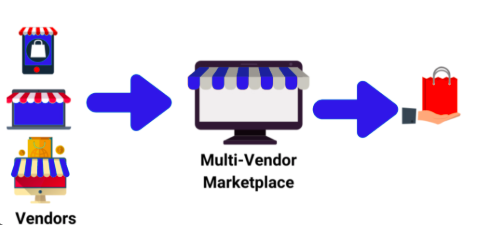
A multivendor platform is an e-commerce solution where multiple independent sellers market their products or services through a single online storefront. These platforms offer a centralized system for managing vendors, processing payments, and handling logistics.
Think of marketplaces like AMAZON, E-BAY, ALI-BABA, Etsy, they allow businesses and individuals to reach global audiences without managing their own website. They can sell to millions sitting at home with minimal marketing efforts.
Get exclusive access to all things tech-savvy, and be the first to receive
the latest updates directly in your inbox.
By utilizing a multi-vendor marketplace platform, businesses can provide a diverse range of products and services without the need to manage inventory or fulfillment directly.
How Do Multivendor Platforms Work?
A multivendor website works by letting different vendors sign up and showcase their products or services on the site. Shoppers can explore and buy items from various vendors all in one online marketplace.
Usually, Multivendor platforms takes care of user access payment processing, order management, and customer support, which allows vendors to concentrate on what they do best. Plus, these sites often come with marketing tools, analytics, and reporting features to help vendors boost their sales.
Seller uploads product details, like price, or manage inventory. A customer can select from different sellers based on who offers the best prices and quality.
What Makes a Multivendor Platforms the Best?
There are many benefits of a multivendor marketplace platform:
- Boosts Customer Experience: Offers a wide selection of products across various categories, making shopping more enjoyable for customers.
- Creates Multiple Income Sources: With various vendors showcasing their products, the platform earns money through listing fees, sales commissions, subscription charges, featured advertisements, and payment processing fees.
- Expands Market Reach: Helps businesses connect with a larger audience, leading to more sales and greater brand visibility.
- Offers Scalability: Provides options for easy growth and expansion based on business needs.
- Streamlines Management: Tools like reporting and analytics support data-driven decisions and help implement marketing strategies smoothly.
- Enhances Credibility and Trust: A diverse range of products and services from different vendors boosts customer confidence and trust in the marketplace.
Top Multivendor Platforms for 2025: A Quick Recap
Questions to ask yourself, when choosing a platform for your multivendor store:
- Is the registration process easy?
- Does it offer elastic search to meet modern consumer habits?
- Is the review process simple, fast, and device-friendly?
- How easy is it to establish a payment system?
- How many features of the platform align with your needs?
1. Shopify (Ideal For Small-Medium Sized Businesses)
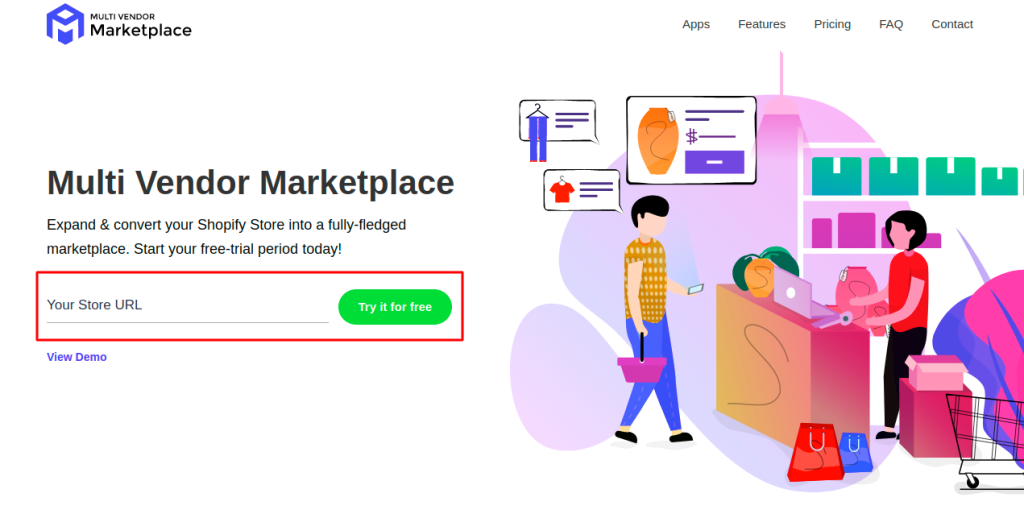
Shopify stands out as a premier multivendor ecommerce platform, widely recognized for its effectiveness as a multi-vendor marketplace. Its intuitive interface and comprehensive features enable users to effortlessly create and manage a multi-vendor store. The platform supports a variety of third-party applications to boost its multi-vendor functionalities. With a vast app ecosystem and reliable customer support, Shopify is an excellent option for businesses of any size.
Key Features
- Quick Setup: Transforms your store into a multi-vendor marketplace in no time.
- Effortless Integration: Easily connects with shipping services, payment processors, and marketing platforms.
- Vendor Oversight: Facilitates easy onboarding and management of various vendors.
- Automated Payments: Simplifies the payment process for vendors.
- Flexible Commission Structure: Allows for adjustable commission rates for each vendor.
- Insights & Reporting: Delivers comprehensive reports on marketplace activity and vendor sales.
- Scalability: Accommodates expanding businesses with no limits on products and vendors.
- User-Friendly Design: Features a straightforward and intuitive interface.
- Mobile Friendly: Functions seamlessly on all devices.
Suitability
Perfect for small to medium-sized enterprises seeking a user-friendly and scalable solution.

Pricing Plans
Plans begin at $29 per month, with extra charges for third-party applications.
2. Magento

Magento is a strong multi-vendor marketplace platform that’s really flexible and can grow with your needs. Since it’s open-source, developers love it because they can customize it a lot. If you add extensions like the Magento 2 Marketplace Extension, you can turn your Magento store into a complete multi-vendor marketplace. Its solid structure is perfect for handling big operations and complicated product listings.
Key Features
- Powerful SEO tools
- Super customizable
- Solid community backing
- Wide range of marketplace add-ons
Suitability
Ideal for medium to large businesses that have development resources available.
Pricing Plans:
- Basic: $299
- Pro: $999
- Essential: $599
3. WooCommerce
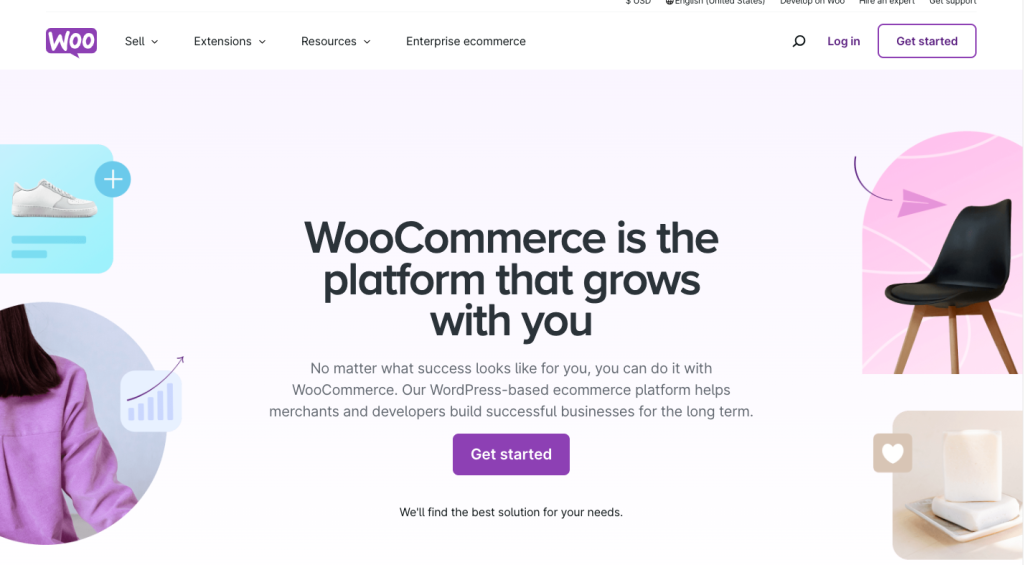
WooCommerce is a widely used WordPress plugin that enables businesses of all sizes to create online stores. With over 3.6 million online stores, It provides straightforward customization options, allowing you to tailor your shop to your preferences.
For those interested in establishing a multivendor marketplace platform, WooCommerce is a strong option. By utilizing plugins such as Dokan and WC Vendors, you can easily convert WooCommerce into a multi-vendor platform, ensuring a smooth experience for both sellers and buyers. Its integration with WordPress enhances its customizability and adaptability for various business requirements.
Its flexibility allows you to have complete control over your product sales. This open-source platform serves as an excellent eCommerce solution for developing a store that meets your unique specifications.
Key Features
- Tailored Customization: Adjusts the platform’s design and functionalities to suit unique requirements.
- Variety of Payment Options: Offers a range of payment methods for convenience.
- Commission Oversight: Simplifies the process of establishing and managing vendor commission rates.
- Growth Potential: Designed to support marketplaces of any size, from small to large.
- Vendor Oversight: Features tools for smooth vendor onboarding and management.
- Integration Capabilities: Supports connections with third-party plugins.
- Open-Source Access: Grants developers complete control over the platform.
- Intuitive User Experience: Ensures easy management for users.
Pricing Plans
- Free: Basic multivendor functionality.
- Pro: $199/year for advanced features.
- Product Vendors: $79/year for simple setup.
4. Webkul
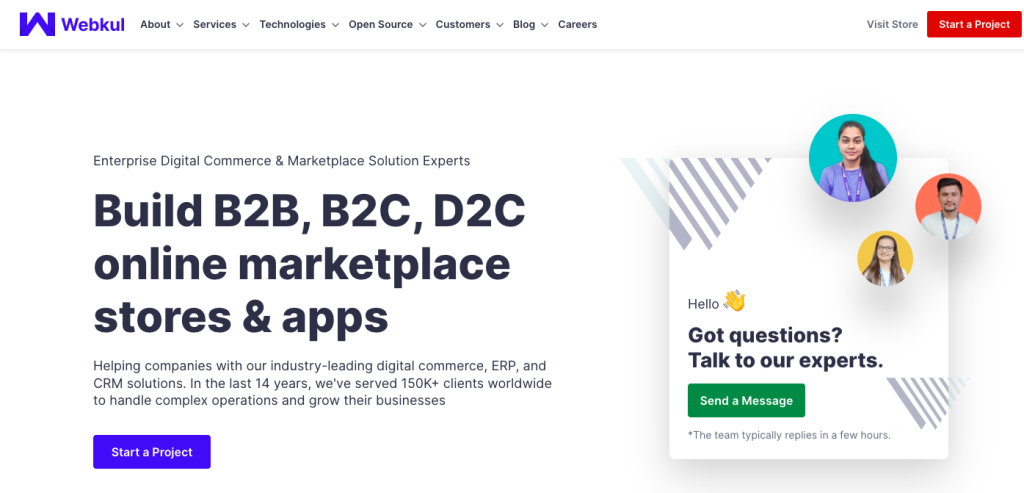
This multivendor marketplace extension turns your existing Magento 2 online store into a complete shopping hub. You can bring in different vendors to set up shop, letting them manage their own stock, shipping, and other responsibilities. Each vendor can showcase a range of products, and they can use shipping services like FedEx, USPS, DHL, PayPal, Stripe, and Aramex. On top of that, this extension is mobile-friendly, so you can easily browse your store from any smart device.
Key Features
- Commission Tracking.
- Individual Seller Profiles.
- Review and Feedback System.
For the Pricing Plans: Visit their Official Site.
5. Yo!Kart
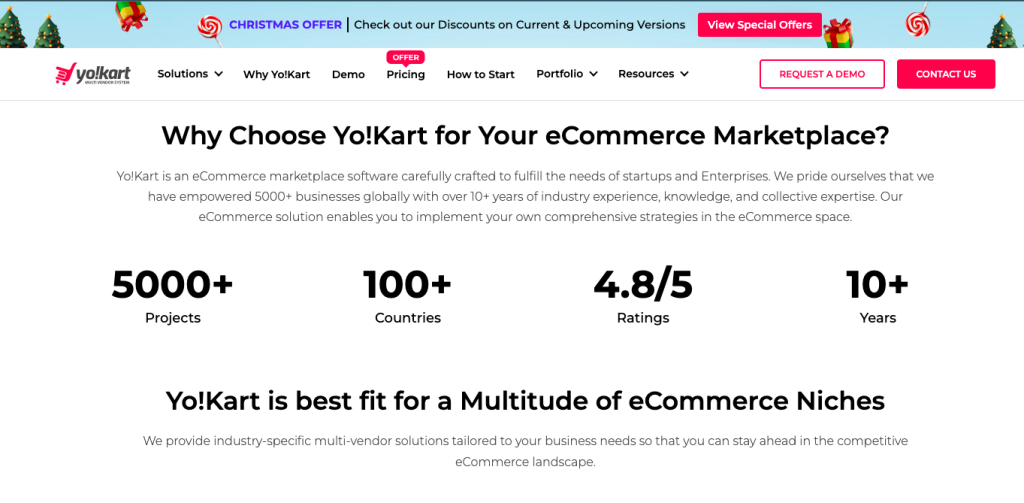
Yo!Kart Multi Vendor is an awesome platform for creating and managing multi-vendor marketplaces.
It offers a super simple onboarding process for vendors along with tools for handling inventory, processing orders, and ensuring secure payments.
With plenty of customization options and built-in analytics, it allows marketplace owners to personalize their sites and boost sales.
Yo!Kart Multi Vendor is ideal for starting new projects or growing existing ones. It provides a variety of customization features and includes must-have tools like multi-currency support, various payment gateways, and an easy-to-use admin panel. Yo!Kart is well-regarded for its emphasis on user experience and performance.
Key Features:
- Highly customizable
- Scalable and secure
- Strong reporting and analytics
- Supports multiple currencies and languages
Suitability:
Perfect for startups and established businesses seeking a solid and customizable solution.
Pricing Plans
One-time fee starting at $499; custom pricing available for extra features.
6. Bagisto
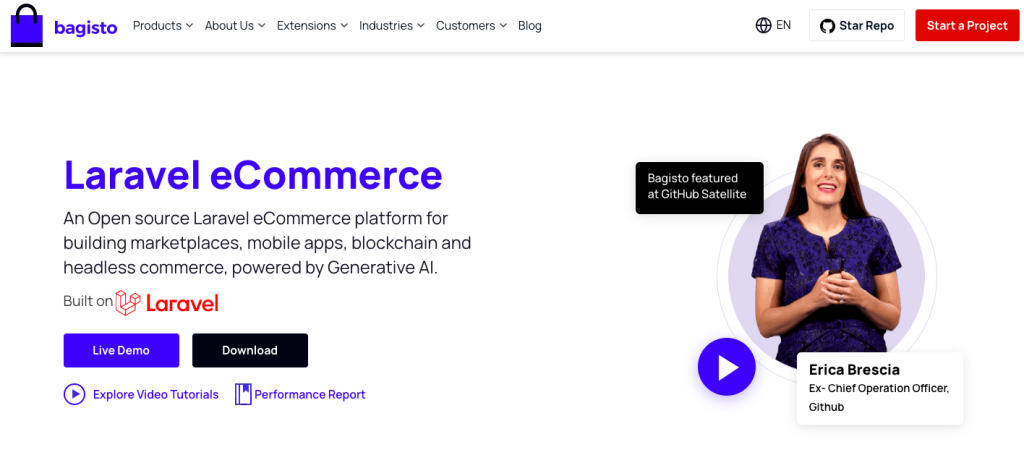
Bagisto, created by Webkul, is an open-source eCommerce framework that runs on the Laravel stack.
This robust platform comes loaded with features such as multi-currency support, localization, access control, multi-channel capabilities, and smooth payment integration.
It’s an all-in-one multivendor eCommerce platform aimed at helping merchants expand and enhance their online businesses. Plus, developers have the freedom to customize the source code to their liking.
When it comes to a multivendor marketplace platform, Bagisto offers a full-fledged solution with its MultiVendor eCommerce Marketplace feature, enabling buyers to explore a wide range of products from vendors around the globe.
Key Features
- Simplifies the process of code creation and deployment.
- Allows for effortless duplication and reuse of components, extensions, and modules.
- Streamlines inventory management across multiple stores.
- Improves product management by supporting product families, attribute types, categories, and configurable products.
- Offers SEO solutions for products to boost the website’s search engine visibility.
Pricing Plans
7. Shipturtle
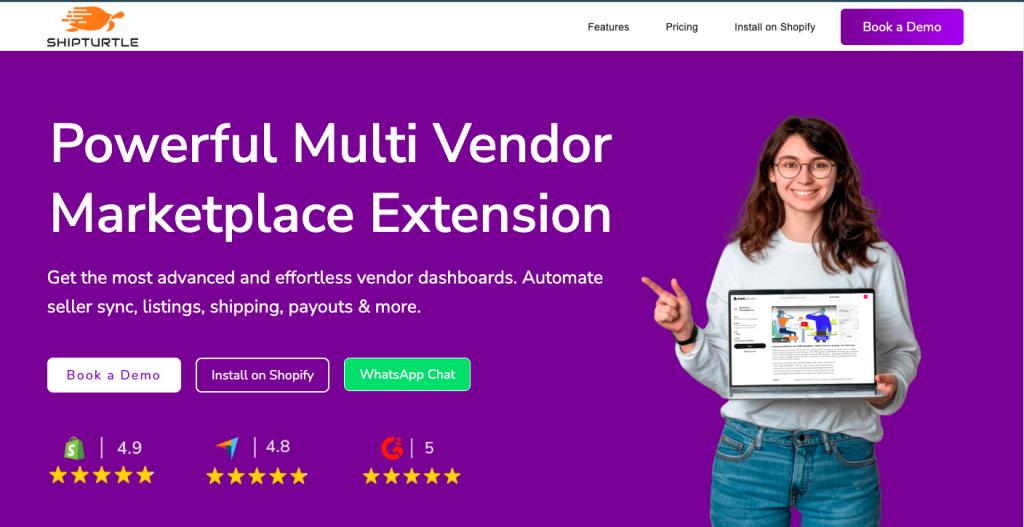
Shipturtle is a rising multi-vendor marketplace software that delivers a complete solution for overseeing various vendors, products, and orders. It features an easy-to-use interface and a variety of tools designed to help you develop and expand your e-commerce venture. With a strong emphasis on automation and efficiency, Shipturtle is an excellent option for companies aiming to optimize their operations.
Key Features
- User-friendly interface
- Strong vendor management capabilities
- Scalable and secure infrastructure
- Extensive support and resources
Suitability:
Ideal for startups and expanding businesses in need of an efficient and accessible platform.
Pricing Plans:
15-day Free trials. No credit card is required. Starting at $49/month for the Startup plan, with custom pricing options available for larger enterprises.
8. Prestashop
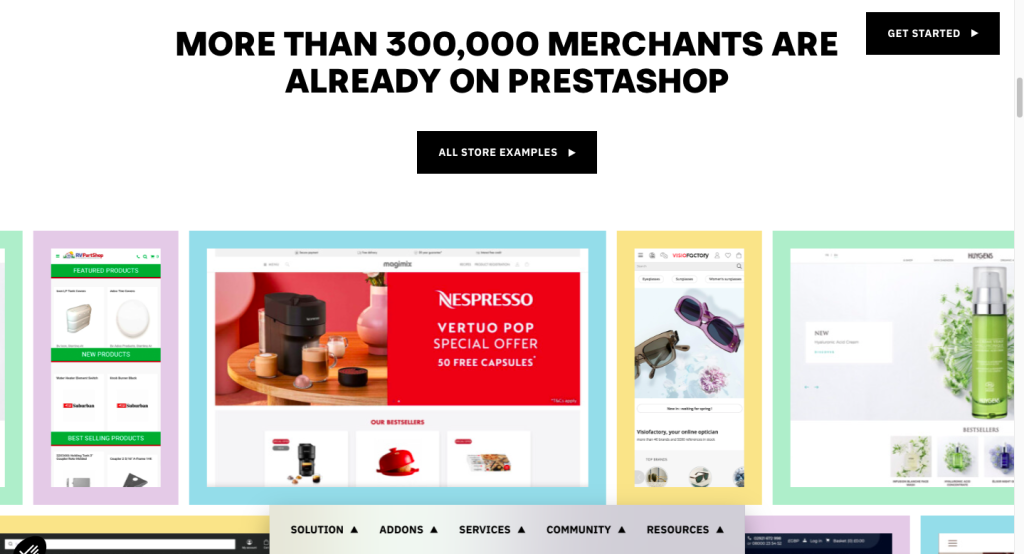
PrestaShop is a well-known e-commerce platform that can be transformed into a multi-vendor marketplace using third-party modules such as PrestaShop Marketplace. Its intuitive interface and comprehensive features make it a favored option for e-commerce enterprises. The active community surrounding PrestaShop offers essential support and resources.
Key Features
- Intuitive interface
- Extensive selection of third-party modules
- Highly customizable
- Strong community backing
Suitability
Perfect for small to medium-sized businesses seeking a flexible, open-source solution.
Pricing Plans
Free core platform; expenses depend on the chosen modules and add-ons.
9. Magento 2 Marketplace Extension – LandofCoder
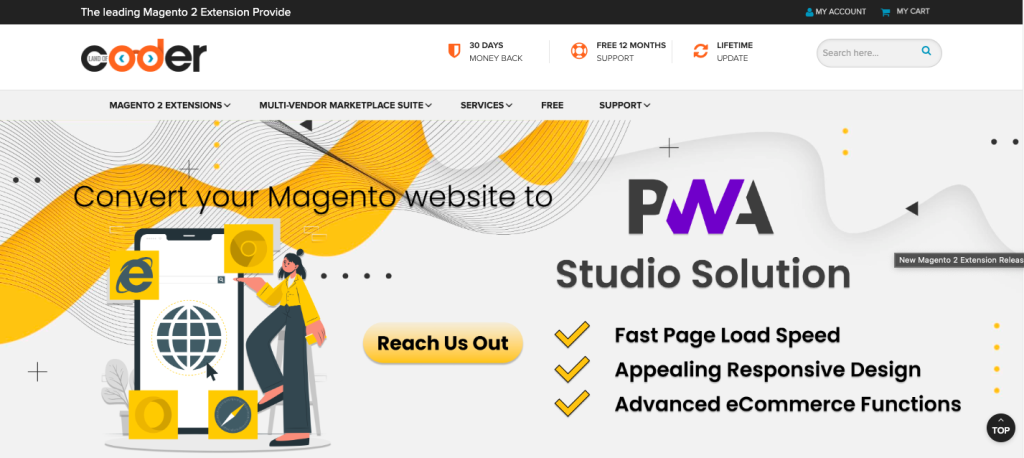
The Magento marketplace extension transforms ecommerce stores into fully functional multi-vendor marketplaces. It is compatible with Magento versions 2.0 to 2.3, ensuring you can use this extension without needing to upgrade your Magento web application.
Key Features
- Vendor Vacation Settings
- Review and Rating System
- Advanced Reporting System
Pricing Plans
- Basic: $299
- Essential: $599
- Pro: $999
10. Zielcommerce
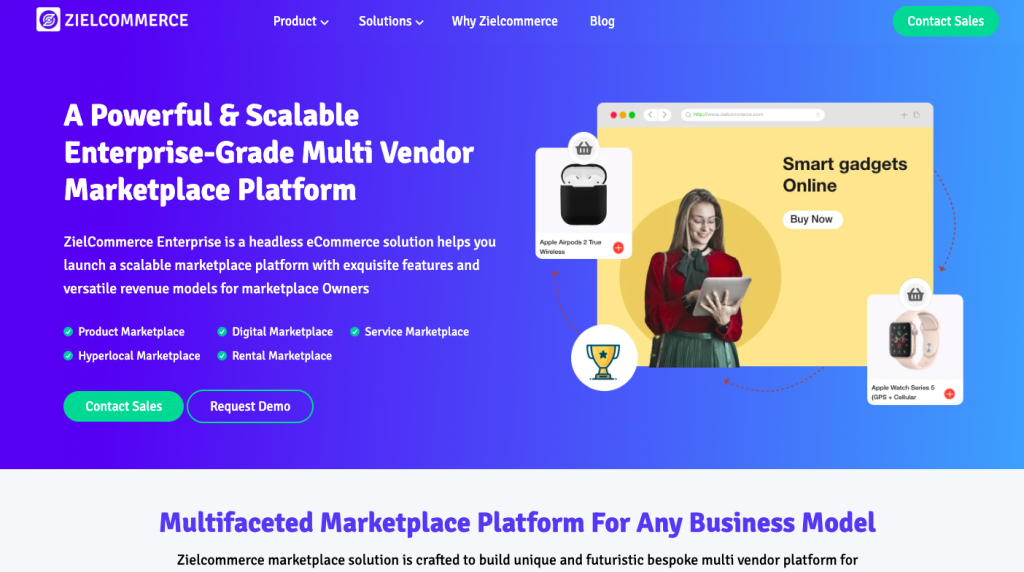
Zielcommerce is an intuitive eCommerce platform designed for businesses, streamlining vendor onboarding, inventory oversight, order fulfillment, and secure payment processing. It provides customizable design features and integrated analytics to enhance performance.
- Mobile-Friendly Design: Guarantees a smooth shopping experience on all devices.
- Simple Vendor Onboarding: Eases the registration process for sellers.
- All-in-One Management Tools: Delivers powerful capabilities for inventory oversight, order fulfillment, and secure transactions.
- Customizable Branding: Enables site owners to tailor their branding.
- Flexible Solution: Accommodates businesses of any size.
- In-Depth Analytics: Provides valuable insights into sales trends and customer behavior.
- SEO and Marketing Tools: Offers resources for effective SEO and marketing initiatives.
Future Trends in Multivendor Platforms
The e-commerce scene is buzzing with some exciting trends and growth opportunities. Personalization is on the rise, as multivendor marketplace platforms are customizing shopping experiences using customer data. There’s also a big shift towards a mobile-first strategy, making websites and apps more user-friendly on phones.
Plus, social media is playing a huge role, letting vendors sell directly on platforms like Facebook and Instagram. Sustainability is gaining traction too, with a spotlight on eco-friendly products, and marketplaces are branching out into international and niche areas.
On top of that, AI and machine learning are stepping up to enhance product recommendations and overall customer experiences, while there’s a stronger focus on cybersecurity and augmented reality to boost engagement. All in all, global online marketplace sales are projected to hit $7 trillion by 2025.
You can also check out this resource for the latest e-commerce marketplace stats.
Conclusion
Multivendor platforms are at the forefront of the eCommerce marketplace industry. This article reviewed 10 leading multivendor marketplace platforms features and pricing plans, with a proper understanding of your goals and needs you can choose the right multivendor platforms for 2025 according to the new trends coming up.
FAQ’s
1. What is a multivendor platform?
A multivendor platform is an online marketplace where various vendors can offer their products or services collectively.
2. Which is the best multivendor platform for small businesses?
Dokan and Sharetribe are great options for small businesses because they are cost-effective and user-friendly.
3. Are multivendor platforms scalable?
Absolutely, platforms such as Magento and Shopify Plus are built to support a large number of vendors and transactions as your business expands.
4. How do multivendor platforms generate revenue?
They usually make money through commissions, vendor fees, advertising, and transaction charges.
5. Can I create a custom multivendor platform?
Yes, platforms like Magento and shipturtle Multivendor offer significant customization options to cater to specific business requirements.



